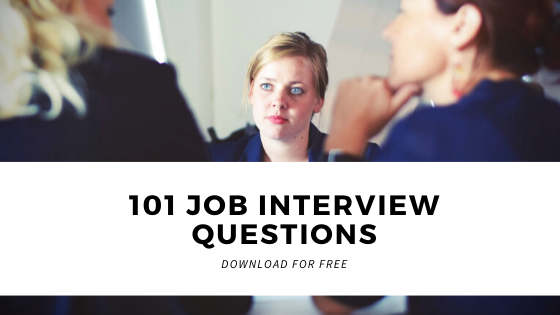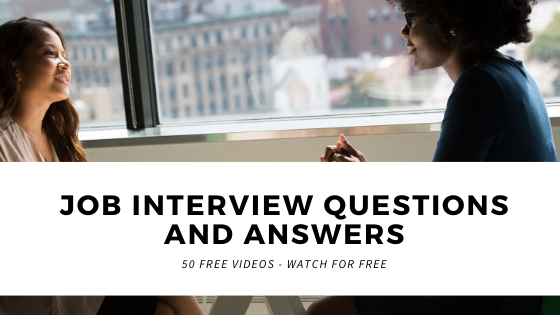There’s a love-hate relationship with job interviews. We love that we have the chance to prove ourselves to a new employer, and hopefully get a new position with a big new salary…but we hate the job interview process; its scary, horrific, terrifying!!!
This series of 10 job interview questions and answers will teach you how to pass your next job interview by explaining how to answer each tricky job interview question
10 Job Interview Questions and Answers
A job interview is a scary place. We want to feel confident during a job interview, knowing that this persona will help us secure a job offer.
The easiest and best way to increase your job interview confidence is by having the interview answers, or a template in which you can insert your personal experiences, to the top 10 job interview questions that you will be asked as part of the organisations recruitment process
10 Answers to 10 Job Interview Questions
Click each link to uncover the reason why this question has been asked in the job interview, and to discover the desired job interview answer
Job Interview Questions 1:
Why do you want to work for this organisation?
99% of job interviews ask the opening question ‘why do you want to work for this organisation?’ or ‘tell me about yourself?‘
The opening interview answer sets the tone of the interview. If an employer sees potential in an applicant, from their opening answer, they will listen more intently, subconsciously encourage the applicant to do well (the halo effect) and having liking towards that person.
In fact, the opening interview answer helps to shape the applicants job interview identity.
Job Interview Questions 2:
What will you do in the first month of the job?
The situational question, ‘what would you do in the first month of the job?’ is designed to check competencies.
An applicant who confidently states clearly the business-as-usual tasks, as well as highlighting a high level of sector knowledge, puts the interviewer at ease, with them thinking ‘this person knows what they are talking about’.
Remember, the goal of the recruitment process is to predict the job performance of each job applicant.
Job Interview Question 3:
What motivates you?
More and more, organisations are recruiting employees who have similar values to the company and fit in well with the company culture.
Hiring a team that will work well together increases staff retention, which increase profits and output.
This strength-based interview question, among others are highly common in professional job interviews.
Job Interview Question 4:
What salary are you seeking?
Salary questions are often asked in a second or third round of job interviews.
Techniques such as baseline theory can help to boost an applicants salary.
Applicants must state their salary expectations clearly and confidently. If an employer has invited an candidate to a second or third interview round, they like the applicants skill set and see value in hiring them.
Job Interview Question 5:
Why did you leave your last job?
Often a hard question to answer.
Reframing techniques help to shift a potential negative outlook into a positive one.
For any negatively framed interview question, applicants must prepare strong high-scoring interview answers.
Job Interview Questions 6:
Who wouldn’t you work with?
In the structured job interview, each interview question is marked against a specific set of criteria.
Employers, therefore, don’t want to waste an interview question. Therefore, each question asked has a purpose.
Tricky questions are asked, sometimes, to check resistance to stress, but other times to review a skillset.
The who wouldn’t you work with question can be answered with a generalisation or a focus on skills and qualities.
Job Interview Question 7:
What is your greatest achievement?
Open questions are the easiest to answer in a recruitment process.
The open questions gives the applicant a license to talk about something they deem to be important. Be careful to follow rule one of a successful job interview outcome, and make each answer relevant to the job criteria.
Use this opportunity to showcase your strengths, abilities and unique selling point.
Job Interview Question 8:
Did you get on with your last manager?
As already mentioned, company culture interview questions are asked in recruitment processes.
The angle of the interview questions makes a difference. Focus the answer on what you gained from the last manager, what they taught you, rather then if you liked them or not.
Job Interview Question 9:
Are you willing to work overtime?
Interview questions are created based on the duties of the job role.
If asked about overtime, as an example, the employer is looking for an employee who would work overtime – or they wouldn’t have asked the question.
Honesty is the best policy. If you don’t fit in with the company culture it is unlikely that you would enjoy working for that organisation.
Job Interview Question 10:
Is there anything you would like to ask me?
Yes is the answer!
Each interviewee must attend a job interview armed with potential questions to ask the employer.
This is expected. Click below for a list of potential questions to ask.
Job Interview Advice







